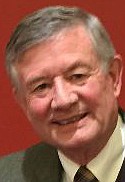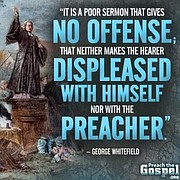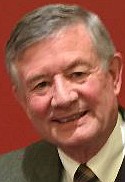FAITHFUL OBSERVATIONS
Bob Shillingstad | Hagadone News Network | UPDATED 5 years, 9 months AGO
The column last week about George Washington and the theme of God’s hand on our country and leaders generated quite a bit of interest and comment. Many expressed that we need another “awakening” or revival in our country. Surprisingly to me were the people who were unfamiliar with Whitefield or the awakenings in America.
Eric Metaxas in his book, “If You Can Keep It” describes the day in early 1739 when a “slight, cross-eyed twenty four year old Englishman stepped off a ship in the bustling harbor of Philadelphia. His arrival was anticipated by nearly everyone who had followed his historic exploits across the ocean throughout that summer in the Pennsylvania Gazette, published by thirty-three year old Benjamin Franklin. No fewer than four thousand were jostling to catch a glimpse of him... Not until two centuries later, when the Beatles landed at New York’s Idlewild Airport, would a British export to America create such giddiness. But why?”
Now that is an introduction that will kindle your intellectual curiosity about who the person was and the effect he had on America! This boyish figure is a preacher really unlike a preacher any had heard. This was George Whitefield.
Although Whitefield had a powerful ministry in England and elsewhere, his greatest work was probably carried out in America. From 1738 to 1770 he made seven preaching tours to America. He would journey up and down through the colonies, spreading the fires of revival wherever he went. He was always ready to preach anywhere.
Usually huge crowds came to hear him. He preached to nearly 6,000 people on the Boston Commons, with the result that the whole city seemed to awaken to spiritual realities. Sometimes he spoke to as many as 20,000 people. He must have had quite a powerful voice in the days when there were no loudspeaker systems!
George Whitefield and Benjamin Franklin were friends. Franklin was very impressed by Whitefield’s preaching. Whitefield was very concerned for Franklin’s unsaved soul.
One day in Philadelphia, Franklin was in attendance when Whitefield was preaching in the open air. Franklin was amazed that Whitefield’s powerful voice could be heard far and wide. Having a scientific mind, Franklin did a little experiment. He walked backward some distance until he could hear the sermon no more. He then did some calculations and concluded that Whitefield’s voice could be heard by 30,000 people in the open air (without a microphone)!
The city was transformed and Franklin described the change as “wonderful.” From his autobiography, it sounds as if he was in regular attendance at all the meetings. He had never seen anything like it, and wrote: “It was wonderful to see the change soon made in the manners of our inhabitants. From being thoughtless or indifferent about religion it seemed as if all the world were growing religious so that one could not walk through the town in an evening without hearing psalms sung in different families of every street.”
As interesting as this is, it would have been better if Franklin had paid close attention to the message of salvation which Whitefield preached. Whitefield wanted Franklin to know the “power of God unto salvation” (Romans 1:16), not the power of his voice.
Historians have recognized George Whitefield as one of the greatest preachers of all times. Between 1736 and 1770 he preached more than 18,000 sermons. He died in Massachusetts in 1770 at age 56.
Was Franklin affected by Whitefield? Did he believe in the Providence of God upon our country? On June 28, 1787, seventeen years after Whitefield’s death, Franklin was attending the Constitutional Convention in Philadelphia as one of the delegates. Much regional disagreement had surfaced and the convention was about to be suspended because of unresolved strife and dissension. It was at this critical moment that Franklin, now 81 years of age, rose to his feet, and addressed the Convention President, George Washington, with these words:
“How has it happened, sir, that we have not hitherto once thought of humbly appealing to the Father of lights to illuminate our understandings? In the beginning of the contest with Great Britain, when we were sensible to danger, we had daily prayers in this room for Divine protection. Our prayers, sir, were heard and they were graciously answered. I have lived, sir, a long time and the longer I live, the more convincing proofs I see of this truth — that God governs in the affairs of men. And if a sparrow cannot fall to the ground without his notice, is it probable that an empire can rise without His aid? We have been assured, sir, in the sacred writings that except the Lord build the house, they labor in vain that build it. I firmly believe this. I therefore beg leave to move that, henceforth, prayers imploring the assistance of heaven and its blessing on our deliberation be held in this assembly every morning before we proceed to business.”
According to those present, “An atmosphere of reconciliation seemed to settle over the convention hall.” Petty grievances and local interests were laid aside, and the delegates went on to complete their task of formulating the American Constitution and Bill of Rights. I think Whitefield must have smiled, and all of heaven with him! As it says in Psalms 22:28, “For the kingdom is the Lord’s; and He is the governor among the nations.”
The American clergy were faithful exponents of the fullness of God’s Word, applying its principles to every aspect of life, thus shaping America’s institutes and culture. They were also at the forefront of proclaiming liberty, resisting tyranny, and opposing any encroachments on God-given rights and freedoms. There is not a right asserted in the Declaration of Independence which had not been discussed by the New England clergy before 1763.
It is strange to today’s generation to think that the rights listed in the Declaration of Independence were nothing more than a listing of sermon topics that had been preached from the pulpit in the two decades leading up to the American Revolution, but such was the case. This was the influence of the Wesleys, Whitefield and large numbers of the clergy who united the colonies and secured our independence and the country we have today.
If Franklin was America’s most irreligious Founder, what does that say for most politicians in Washington, D.C., today? If Franklin was the most irreligious of our Founders, then it shows how far our nation has fallen and how desperate we are for another Great Awakening in our land. We need to renew Franklin’s prayer for our country today. And to know more of our marvelous history!
“If my people, which are called by my name, shall humble themselves, and pray, and seek my face, and turn from their wicked ways; then will I hear from heaven, and will forgive their sin, and will heal their land.” — II Chronicles 7:14.
•••
Bob Shillingstad’s religion columns appear Saturdays in The Press. Email Bob: [email protected]
ARTICLES BY BOB SHILLINGSTAD
Rights? They're now running wild
Over the past few decades we have had a "rights" explosion on the legal landscape. We now have criminal rights, women's rights, children's rights, gay rights, animal rights and the list goes on. Certainly we have seen the growth of litigation and without a doubt one of the major causes is a mentality of rights.
Another side to teachers union
There are many of the "My Turn" columns that need a response, correction or clarification; however, I normally decide to ignore the misinformation and move on. The column in Saturday's paper entitled "Why I belong to a union" by the CEA President Derek Kohles gave such an unbelievable view of the teachers union that I had to respond.
Tattoos hint at society's downward spiral
I have to congratulate Karl Kime for his excellent column on the state of our culture as represented by the obsession with tattoos. I do have to take exception with a few points that he made.





